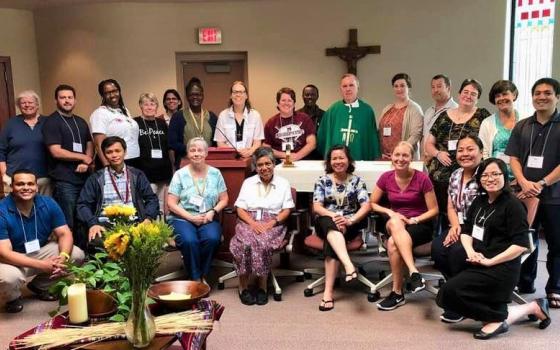In a conversation with a colleague about women in the church, she said, "Well, I hope soon they finally let sisters get married." There was something like sympathy in her eyes. I know the comment was well-meaning, but it also revealed that my colleague didn't understand my commitment at all.
The unique contribution of this vocation comes precisely from renouncing a life commitment to a person and instead making a life commitment to God and God's people. The strength in my vocation comes from living in community with women who have made the same life commitment. My vows are freely chosen and free-ing. Poverty, celibacy, and obedience are the framework that make my life what it is.
Of course, the vowed life is changing. And alongside conversations about the evolution of religious life, conversations are happening about alternative and complementary forms of religious life. Many communities continue to explore and develop the associate relationship. In January, Jamie Manson spoke with FutureChurch about how the church might include non-vowed but committed people as we imagine the future of religious life, particularly highlighting intentional communities that have taken shape around values of hospitality, sharing and justice. These are fruitful questions that flow out of authentic human longings. Our God is infinitely creative and diversity-loving; of course there could be new ways of living commitment to our timeless tradition!
However, as a young vowed religious, I am uncomfortable when the conversations seem to seek not additional forms of commitment but replacements for vowed religious life. Some have suggested that it's time to focus on temporary commitments, that young people today aren't capable of committing for life. Some accept a diminishment paradigm; they believe that vowed life is dying or increasingly irrelevant. I reject these notions.
The truth is this: God is still calling people to make lifelong, vowed religious commitments, and people are still saying yes.
In July, I attended the Religious Formation Conference Life Commitment Program, for religious preparing for or discerning perpetual vows. There were 22 of us from varied congregations, countries, backgrounds and generations, drawn together by the voice of God in the depths of our journeys. We spent a week reflecting on our vows through presentations, conversations, quiet time, prayer and liturgy, and fun. Our being there with and for each other reinforced what my heart already knew: forever is possible.
Last Saturday, three companions from the Life Commitment Program professed their perpetual vows with the Society of the Divine Word, and I got to be there. As my friends stepped forward to publicly declare their total self-gift, I was overcome with reverence and joy. They are all in, for the rest of their days. With every day, every breath to come, their primary, foremost commitment is to God, God's people and the Gospel. That's powerful stuff! I wonder, gratefully, what will be made possible through their freely-offered, forever "yes."
My mind wanders back to our congregation's annual August jubilee liturgy, where my sisters celebrate 50, 60, 75 and more years lived for the mission of Jesus through the vows. Years ago, they made the same promises that my SVD brothers made last week. And they are still faithful. It's moving to imagine the impact their gift of self has had on the countless people they've walked with over so many years. This August, as I listened to them renew their vows around the baptismal font, my heart overflowed joy. Their witness to a life commitment touched into my own yearnings. I know that I, too, want to live all of my years singularly devoted to Christ.
I want my life to proclaim that God is worth everything. I want to be available to respond when urgent needs arise. I want to love widely. I want to serve in places nobody else wants to go. I want to share life in common and build intentional community. I want to stand for justice. I want prayer to be the source of all I do. I want God's call to be the only claim on my life. I want to help make God's love visible. And I want to do all of this with my sisters who have made the same life commitment. There's something special about knowing that we are "all in" together, that the sisters I walk with in formation now will very likely be by my side when we stand around the baptismal font at our own jubilees. It will not be easy, but with God's grace, it is possible.
I'm aware that this article might seem to come at a strange time, in the midst of scandal and tragedy. Some might wonder why anyone would want to talk about life commitment in the Catholic Church right now. I get it. I am outraged, saddened, and disgusted by the actions of bishops and priests. They caused unspeakable harm to precious human beings. They did not live in a manner worthy of their call. I add my voice to the multitude that has already spoken: the sins must come to light, there must be accountability, clericalism must be condemned and the way we do church leadership must drastically change. At the same time, I feel more compelled than ever to live into the depths of my own commitment. The church is not just the institution. I, too, am the church. You are the church. I want to strive to be a credible witness to the love of the God who has called me. And that is worth the gift of my life.
Each vocation reveals something of God; each person living out her or his God-given call contributes something unique to the building up of the reign of God. I firmly believe that the world still needs that which a vowed life commitment makes possible. For generations, women and men religious have felt impelled by Jesus to offer everything that they are to Jesus' cause. Young people today still have the capacity and the desire for such commitment. We can be faithful because God is faithful. And our fidelity can hopefully, in some small way, reflect the everlasting commitment of God to God's people.
[Tracy Kemme is a Sister of Charity of Cincinnati who authored the blog Diary of a Sister-in-Training during formation. After a decade in social justice and Hispanic ministry, she is working toward her master's degree in pastoral ministry at Catholic Theological Union in Chicago.]

